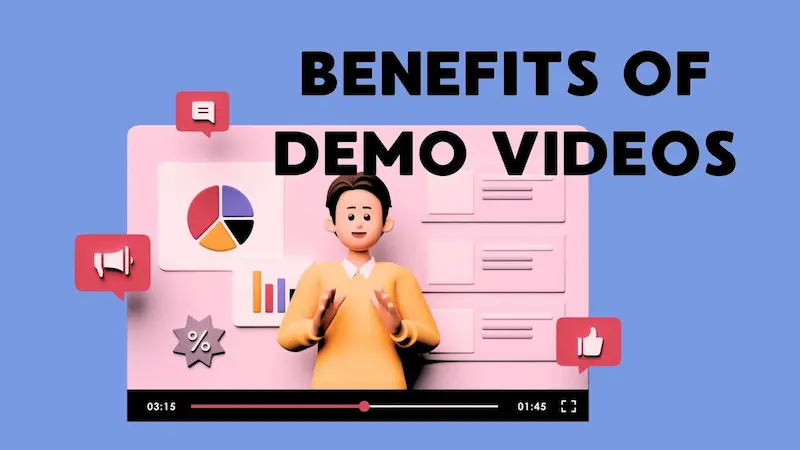A demo video is a short, engaging video that shows how a product, service, or software works in real life. It’s one of the most effective ways to explain complex ideas quickly and visually. Unlike written instructions or static images, demo videos allow viewers to see a product in action, making it easier for them to understand its features and benefits.
Businesses and creators use demo videos to attract potential customers, build trust, and boost sales. Whether you’re launching a new app, promoting a gadget, or providing a tutorial, a well-made demo video can make your product stand out and leave a lasting impression.
Key Benefits of Demo Videos

Demo videos are powerful tools that can make a significant difference in how customers perceive and interact with your product. Here’s a deeper look at their benefits:
1. Enhances Understanding
A demo video allows viewers to see a product or service in action, making it easier to understand how it works. Instead of reading long, complicated instructions or manuals, customers can watch a step-by-step demonstration. This visual learning method helps reduce confusion and ensures users quickly grasp key features. For example, software demo videos show interfaces and workflows clearly, which saves time and prevents mistakes.
2. Boosts Engagement
People naturally prefer watching videos over reading text. A well-crafted demo video captures attention, keeps viewers engaged, and communicates information in an enjoyable format. Interactive visuals, animations, or on-screen highlights can make the video more interesting, increasing the chances that viewers will watch it until the end. Engaged viewers are more likely to remember your product and come back for more.
3. Builds Trust
Demo videos show your product exactly as it is, helping to build credibility and trust. When potential customers see a product being used in real scenarios, they feel confident that the product delivers on its promises. This transparency is especially important for new products, tech gadgets, or online services, where buyers want reassurance before making a purchase.
4. Increases Conversion Rates
A clear, informative demo video can directly influence buying decisions. By demonstrating the value of a product, showing how it solves problems, and highlighting unique features, demo videos make it easier for viewers to take action. Studies show that products with demo videos often have higher conversion rates compared to products with only images or text descriptions.
5. Supports Marketing and Sales Efforts
Demo videos are versatile marketing tools. They can be shared on websites, social media platforms, email campaigns, and sales presentations. A short, compelling video can explain your product faster than any brochure or article. It also helps your marketing stand out in crowded online spaces, making your brand more recognizable and memorable.
6. Reduces Customer Support Needs
A good demo video can answer common questions before customers even ask them. By showing how a product works and troubleshooting basic issues visually, you can reduce support requests, save time for your team, and improve customer satisfaction.
You may also like it:
Vlog Video Editing Tips For Stunning YouTube Vlogs
How To Download YouTube Videos In PC | Full Guide
Vlog Editing Guide: Tips, Tools, Benefits & Drawbacks
Types of Demo Videos

Demo videos come in different styles depending on the product, audience, and purpose. Understanding the types can help you choose the right format for your needs.
1. Product Demo Videos
Product demo videos focus on showing a physical product in action. They highlight key features, explain how it works, and demonstrate its value. These videos are especially effective for gadgets, household items, or tools. For example, a kitchen appliance demo video might show how easy it is to use and clean, helping customers see its practical benefits.
2. Software or App Demo Videos
These demos are designed for digital products like software applications, mobile apps, or online platforms. They walk users through the interface, features, and key functionalities. For instance, a project management app demo might show how to create tasks, assign team members, and track progress. Screen recordings and clear annotations are often used to make the process easy to follow.
3. Tutorial Videos
Tutorial demo videos teach viewers how to perform specific tasks using your product. They are step-by-step guides that help users get the most out of a product. For example, a camera company might create a tutorial video showing how to adjust settings for the best photo quality. These videos are useful for onboarding new customers and reducing support questions.
4. Explainer Videos
Explainer demo videos often use animations, graphics, or illustrations to show a product’s benefits or explain complex concepts. They are ideal when a product or service is too abstract to show directly. For example, a fintech company might use animated explainer videos to demonstrate how their online banking system works securely and efficiently.
5. Interactive Demo Videos
Interactive demos allow viewers to click, choose options, or explore features themselves. These videos give users a sense of control and engagement. For example, a car company might offer an interactive demo where users can select different colors, interiors, or features to see how the vehicle looks in real time.
6. Testimonial-Based Demo Videos
Some demo videos combine product demonstration with customer testimonials. These videos show real users talking about their experience while the product is being used. They are effective for building trust and showing practical benefits through real-life use cases.
Tools for Creating Demo Videos
Creating a professional demo video doesn’t have to be difficult. There are many tools available, ranging from beginner-friendly to advanced options. Here are some of the best tools to consider:
1. Loom
Loom is a simple and fast tool for recording your screen and webcam. It’s perfect for creating software demos, tutorials, or quick product walkthroughs. Loom allows you to share videos instantly with a link, making it ideal for team collaboration and online presentations.
2. Camtasia
Camtasia is a professional screen recording and video editing software. It’s great for creating detailed demo videos with annotations, callouts, and transitions. Camtasia is especially useful if you want to produce polished, high-quality videos for marketing or training purposes.
3. Animoto
Animoto is a drag-and-drop video creation tool that allows you to make demo videos without advanced technical skills. It offers templates, music, and text overlays to help you quickly produce engaging videos for social media or websites.
4. Adobe Premiere Pro
Adobe Premiere Pro is an advanced video editing tool used by professionals. It gives you full control over video quality, effects, transitions, and audio. While it requires more skill, Premiere Pro is ideal for creating high-quality, cinematic demo videos that impress your audience.
5. ScreenFlow (for Mac users)
ScreenFlow is a Mac-based tool that combines screen recording and video editing. It’s excellent for software demos, tutorials, and training videos. You can record your screen, webcam, and audio simultaneously and edit them with professional effects.
6. Biteable
Biteable is an online platform for creating quick demo and explainer videos using animations and templates. It’s beginner-friendly and perfect for marketing-focused demo videos that need to be eye-catching and easy to produce.
Tips for Making a Successful Demo Video
Creating a demo video that truly engages viewers and delivers results requires more than just recording a product. Here are practical tips to make your demo video successful:
1. Focus on Solving a Customer Problem
Start by understanding your audience’s needs. Your demo should show how the product solves a real problem or makes life easier. This approach helps viewers see the value of your product immediately.
2. Highlight Key Features First
Show the most important or unique features at the beginning of the video. People often decide quickly whether to continue watching, so start with the highlights to grab attention and keep viewers engaged.
3. Keep the Tone Friendly and Relatable
Avoid sounding too technical or robotic. Use a friendly, conversational tone that connects with your audience. Explain steps clearly and in simple language so everyone can follow along.
4. Use High-Quality Audio and Visuals
Clear visuals and good sound quality make your video look professional. Use close-ups, clear screen recordings, and a good microphone. Avoid shaky camera work or background noise, as it can distract viewers.
5. Test Your Video Across Devices
Ensure your video works on different devices and screen sizes, including mobile phones, tablets, and computers. This ensures a smooth viewing experience for all users.
6. Include a Call-to-Action (CTA)
End your video with a strong CTA, encouraging viewers to take the next step. This could be signing up, buying the product, or visiting your website. A clear CTA increases the likelihood of turning viewers into customers.
7. Keep it Concise and Engaging
Avoid overloading your video with unnecessary information. Focus on clarity and brevity—shorter videos are more likely to be watched in full and shared with others.
8. Add Captions or Subtitles
Adding captions helps viewers follow along, especially when watching without sound. It also improves accessibility for a wider audience, including those with hearing difficulties.
Common Mistakes to Avoid in Demo Videos

Creating a demo video can be highly effective, but certain mistakes can reduce its impact. Here are common errors to watch out for:
1. Making the Video Too Long
Long videos can lose viewers’ attention. Avoid overloading your video with unnecessary details. Keep it short and focused—ideally 1–3 minutes for most demos. If your product is complex, consider creating multiple shorter videos instead of one long one.
2. Overcomplicating the Content
Using technical jargon or showing too many features at once can confuse viewers. Simplify your message and focus on the most important benefits and functions. Clear, concise explanations work best.
3. Poor Audio or Visual Quality
Low-quality visuals or audio can make your demo look unprofessional and hard to follow. Always use good lighting, clear screen recordings, and a quality microphone to ensure your video is easy to watch and understand.
4. Skipping the Call-to-Action
Without a clear CTA, viewers may finish watching and take no action. Always tell your audience what to do next, whether it’s signing up, purchasing, or learning more.
5. Ignoring Audience Needs
Failing to understand your audience can make your demo irrelevant. Focus on solving problems and highlighting features that matter most to your target viewers.
6. Neglecting Testing and Feedback
Publishing a video without reviewing it can lead to errors or missed improvements. Test your demo on different devices and gather feedback to ensure it’s clear, engaging, and professional.
By avoiding these mistakes, you can create demo videos that are engaging, informative, and effective at converting viewers into customers.
What is a demo video?
A demo video is a short video that shows how a product, service, or software works. It explains key features, demonstrates benefits, and helps viewers understand how to use the product effectively.
How long should a demo video be?
Most demo videos should be 1–3 minutes. This keeps viewers engaged and ensures the content is concise. For complex products, consider breaking the demo into multiple short videos.
What types of demo videos are there?
Common types include:
Product demo videos
Software or app demos
Tutorial videos
Explainer videos
Interactive demo videos
Testimonial-based demos
What tools can I use to create a demo video?
Some popular tools include Loom, Camtasia, Animoto, Adobe Premiere Pro, ScreenFlow, and Biteable. The choice depends on your skill level, budget, and video complexity.
How can I make my demo video more engaging?
Keep it short and focused
Highlight the most important features first
Use clear visuals and good audio
Add captions or subtitles
Include a strong call-to-action at the end
Conclusion
Demo videos are an essential tool for businesses, creators, and educators. They showcase products, explain features, and help customers understand how a product works in a way that text or images alone cannot. By creating clear, engaging, and well-planned demo videos, you can capture attention, build trust, and increase conversions.
Whether you’re making a product demo, software walkthrough, tutorial, or explainer video, focusing on clarity, brevity, and audience needs will make your video more effective. Remember to use high-quality visuals, add voiceovers or captions, and include a strong call-to-action to guide viewers toward the next step.
